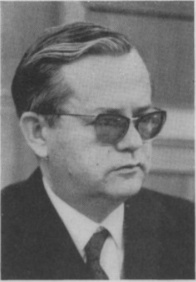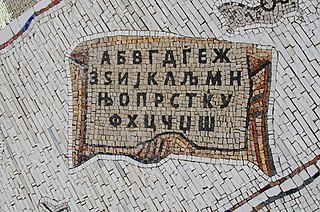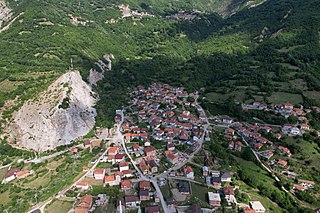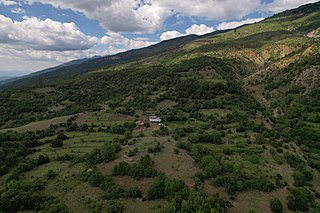
Macedonian is an Eastern South Slavic language. It is part of the Indo-European language family, and is one of the Slavic languages, which are part of a larger Balto-Slavic branch. Spoken as a first language by around two million people, it serves as the official language of North Macedonia. Most speakers can be found in the country and its diaspora, with a smaller number of speakers throughout the transnational region of Macedonia. Macedonian is also a recognized minority language in parts of Albania, Bosnia and Herzegovina, Romania, and Serbia and it is spoken by emigrant communities predominantly in Australia, Canada and the United States.

Macedonians are a nation and a South Slavic ethnic group native to the region of Macedonia in Southeast Europe. They speak Macedonian, a South Slavic language. The large majority of Macedonians identify as Eastern Orthodox Christians, who share a cultural and historical "Orthodox Byzantine–Slavic heritage" with their neighbours. About two-thirds of all ethnic Macedonians live in North Macedonia and there are also communities in a number of other countries.

The Socialist Republic of Macedonia, or SR Macedonia, commonly referred to as Socialist Macedonia, Yugoslav Macedonia or simply Macedonia, was one of the six constituent republics of the post-World War II Socialist Federal Republic of Yugoslavia, and a nation state of the Macedonians. After the transition of the political system to parliamentary democracy in 1990, the Republic changed its official name to Republic of Macedonia in 1991, and with the beginning of the breakup of Yugoslavia, it declared itself an independent country and held a referendum on 8 September 1991 on which a sovereign and independent state of Macedonia, with a right to enter into any alliance with sovereign states of Yugoslavia was approved.

The Torbeši are a Macedonian-speaking Muslim ethnoreligious group in North Macedonia and Albania. The Torbeši are also referred to as Macedonian Muslims or Muslim Macedonians. They have been culturally distinct from the Orthodox Christian Macedonian community for centuries, and are linguistically distinct from the larger Muslim ethnic groups in the greater region of Macedonia: the Albanians, Turks and Romanis. However, some Torbeši also still maintain a strong affiliation with Turkish identity and with Macedonian Turks. The regions inhabited by these Macedonian-speaking Muslims are Debarska Župa, Dolni Drimkol, Reka, and Golo Brdo.

The existence and distinctiveness of the Macedonian language is disputed in Bulgaria and the name of the language was disputed by Greece. By signing the Prespa Agreement, Greece accepted the name "Macedonian language" in reference to the official language of North Macedonia.

Blaže Koneski was a Macedonian poet, writer, literary translator, and linguistic scholar.
The romanization of Macedonian is the transliteration of text in Macedonian from the Macedonian Cyrillic alphabet into the Latin alphabet. Romanization can be used for various purposes, such as rendering of proper names in foreign contexts, or for informal writing of Macedonian in environments where Cyrillic is not easily available. Official use of romanization by North Macedonia's authorities is found, for instance, on road signage and in passports. Several different codified standards of transliteration currently exist and there is widespread variability in practice.
Bulgarians are an ethnic minority in North Macedonia. Bulgarians are mostly found in the Strumica area, but over the years, the absolute majority of southeastern North Macedonia have declared themselves Macedonian. The town of Strumica and its surrounding area were part of the Kingdom of Bulgaria between the Balkan wars and the end of World War I, as well as during World War II. The total number of Bulgarians counted in the 2021 Census was 3,504 or roughly 0.2%. Over 100,000 nationals of North Macedonia have received Bulgarian citizenship since 2001 and some 53,000 are still waiting for such, almost all based on declared Bulgarian origin. In the period when North Macedonia was part of Yugoslavia, there was also migration of Bulgarians from the so called Western Outlands in Serbia.

The official language of North Macedonia is Macedonian, while Albanian has co-official status. Macedonian is spoken by roughly two-thirds of the population natively, and as a second language by much of the rest of the population. Albanian is the largest minority language. There are a further five national minority languages: Turkish, Romani, Serbian, Bosnian, and Aromanian. The Macedonian Sign Language is the country's official sign language.

Ethnic Macedonians in Bulgaria are one of the ethnic communities in Bulgaria. They are concentrated within the Blagoevgrad Province and the capital Sofia. In the latest 2021 Bulgarian census 1,143 citizens declared themselves as ethnic Macedonians.

The Galičnik dialect or Small Reka dialect is a member of the subgroup of western and north western dialects of the western group of dialects of Macedonian. The dialect is spoken on small territory on the mountain Bistra in western part of the Republic of Macedonia. The name of the dialect is derived by the biggest village in that area- Galičnik. Also the dialect is spoken in many other small villages including the village Gari. The Galičnik dialect is closely related with the Reka dialect which is spoken north-western of Galičnik dialect. This dialect is well known in Republic of Macedonia because of the archaic words that this dialect has. The dialect can be found in many historically important literary works for the Macedonian literature. One of the most important is Ǵorǵija Puleski and his dictionary of three languages.
Slavic speakers are a minority population in the northern Greek region of Macedonia, who are mostly concentrated in certain parts of the peripheries of West and Central Macedonia, adjacent to the territory of the state of North Macedonia. Their dialects are called today "Slavic" in Greece, while generally they are considered Macedonian. Some members have formed their own emigrant communities in neighbouring countries, as well as further abroad.

Republic Day or the Day of the Republic or Ilinden is a major national holiday of North Macedonia. It is celebrated on 2 August, which is also a major religious holiday – Ilinden. It commemorates two major events in the establishment of the statehood of the country which took place on this date:
Independence Day in North Macedonia is celebrated on 8 September. It has been a national holiday since 1991, when, following a referendum for Independence, SR Macedonia gained its independence from Yugoslavia, where it was a federal state, and became a sovereign parliamentary democracy.

Macedonian studies is an academic discipline within Slavic studies that focuses on the comprehensive study of the Macedonian language, literature, history, and culture. As part of Slavic studies, it falls within the subgroup of South Slavic languages and cultures. Apart from North Macedonia, Macedonian Studies is also taught at universities worldwide, including in Albania, Canada, Poland, the United States, and post-Yugoslav countries and across continents. A person who studies Macedonian is called a Macedonian specialist.

Dolno Kosovrasti is a village in the municipality of Debar, North Macedonia.

Kočišta is an abandoned village in the municipality of Centar Župa, North Macedonia.

Day of the Macedonian Uprising is a public holiday in North Macedonia, commemorating what is considered there as the beginning of the communist resistance against fascism during World War II in Yugoslav Macedonia, on October 11.
The Aromanian National Day is the national day of the Aromanians, an ethnic group of the Balkans scattered in Albania, Bulgaria, Greece, North Macedonia, Romania and Serbia. It is normally celebrated by Aromanians from various countries in which they are native and also by the Aromanian diaspora, but many Aromanians of Greece do not observe it.
Macedonian Language Day is a working holiday in North Macedonia, observed annually on 5 May. On that day in 1945, the government of Yugoslav Macedonia adopted the Macedonian alphabet as the official script of the republic. Two months later, on 7 June, the Ministry of Education approved the first orthography and thus codified the Macedonian language.















